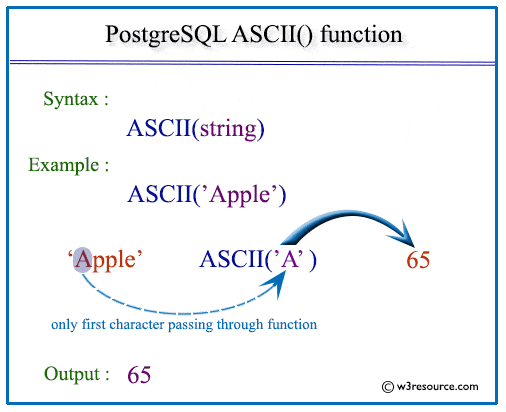PostgreSQL ASCII() function
ASCII() function
The PostgreSQL ASCII function is used to obtain the ASCII code of the first character in a given string. This function is valuable for various text processing tasks where understanding or manipulating the underlying numerical representation of characters is necessary.
Uses of ASCII() Function
- Character Encoding: Determine the ASCII code of characters for encoding and decoding processes.
- Data Validation: Validate text data by checking the ASCII values of characters.
- Sorting and Comparison: Use ASCII values for custom sorting or comparison operations.
- Text Analysis: Analyze the character composition of strings by examining their ASCII values.
- Debugging: Identify non-printable or special characters in strings by their ASCII codes.
- String Manipulation: Convert or replace characters based on their ASCII values for advanced string manipulation.
Syntax:
ascii(<string>)
PostgreSQL Version: 9.3
Visual Presentation of PostgreSQL ASCII() function
Example: PostgreSQL ASCII() function :
In the following example, PostgreSQL ascii function returns the code of the first character of the given string.
SQL Code:
SELECT ascii('w3resource') AS "ASCII of first character";
Output:
ASCII of first character
--------------------------
119
(1 row)
PostgreSQL UPPER() function using Column :
Sample Table: employees.
If we want to display the employee_id, first name, ASCII value of first letter of first_name and ASCII value of the 1st letter of first_name after convert it in lower case for those employees who belong to the department which department_id is 100 from employees table , the following SQL can be executed:
SQL Code:
SELECT employee_id,first_name,
ascii(first_name) "ASCII value of first character",
ascii(lower(first_name)) "ASCII value of first character"
FROM employees
WHERE department_id=100;
Output:
employee_id | first_name | ASCII value of first character | ASCII value of first character
-------------+-------------+--------------------------------+--------------------------------
108 | Nancy | 78 | 110
109 | Daniel | 68 | 100
110 | John | 74 | 106
111 | Ismael | 73 | 105
112 | Jose Manuel | 74 | 106
113 | Luis | 76 | 108
(6 rows)
Previous: UPPER function
Next: BTRIM function

